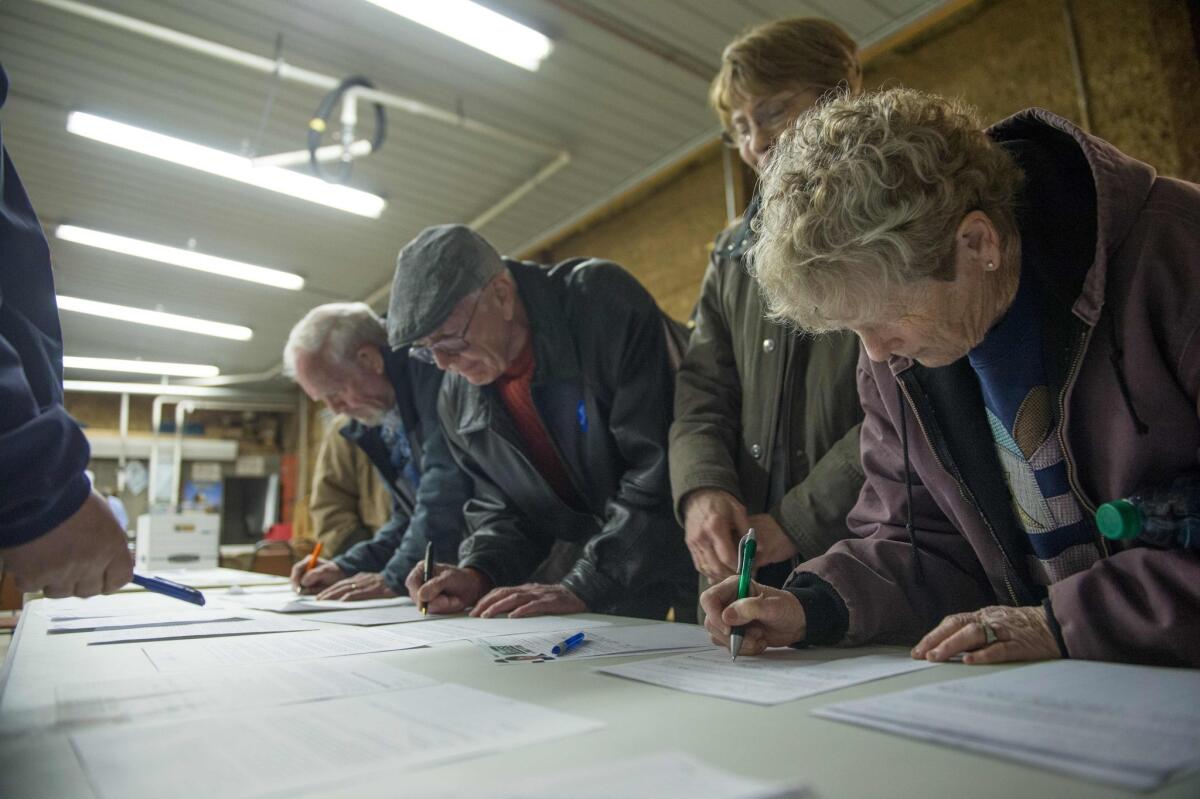Iowa voters are bringing the caucus to California and beyond

- Share via
When Dean A. Genth tries to convince fellow Iowans at a caucus on Monday to join him in supporting Pete Buttigieg for president, it won’t be in his hometown on the icy Winnebago River; it will be in the balmy desert resort of Palm Springs.
“It’s the smartest way to caucus if you’re an Iowan,” Genth, 70, said with a laugh. A precinct captain for the former mayor of South Bend, Ind., Genth is spending most of the winter in Palm Springs, some 1,500 miles from his snowbound home in Mason City.
Iowa’s Democratic Party usually requires registered voters to gather in a room near their homes and sort themselves into groups backing each candidate. But this year, it’s hosting satellite caucuses to allow Iowans who are out of state to vote in the contest that kicks off the race for the Democratic presidential nomination.
The party will expand the reach of the caucuses to Iowa students attending colleges out of state and snowbirds like Genth who flee the state’s brutal winters. The 27 caucus locations out of state include Tucson and Gulf Breeze, a beach resort town on Florida’s Panhandle. Also on the list are Brown University in Providence, R.I., the University of Pennsylvania in Philadelphia, and Marquette University in Milwaukee.
As many as 140 Iowans are expected to attend the California sites — one in Palm Springs and another at Stanford University. Then there are some who will be caucusing abroad in Paris, Glasgow and Tbilisi, Georgia.
The gatherings out of state will run like regular precinct caucuses, with the number of allocated delegates weighted by total crowd attendance.
For some Iowans, the experience will be not only a first caucus outside the state, but a first, ever. Two students who organized the Stanford caucus on campus rallied other voters from Iowa with help from the university’s registrar.
Stanford graduate student Ahmi Dhuna, one of the organizers, was unable to caucus in 2016 as an undergraduate there. Traveling to her hometown of Burlington, Iowa, is laborious and expensive; plane tickets cost about $400, and often the trip involves multiple airports, making it an all-day ordeal. The Stanford site will most likely be students and first-time caucusgoers who couldn’t make it back home, she said.
Dhuna got excused from her classes on Monday, despite multiple midterm exams next week. She’s a teaching assistant in a class about democracy, and the professor encouraged students to observe the remote caucus.
“It’s a huge year for young people to get involved in politics, and being able to realize my potential as an Iowan from afar is really special,” Dhuna said.
Kathryn Ikeda, 20, a student at the London School of Economics and Political Science, didn’t want to miss her first caucus. Ikeda plans to take a two-hour train ride to Paris to caucus for Massachusetts Sen. Elizabeth Warren.
It’s worth it because she’s passionate about participating in what she considers one of the few nights when Iowans can show off, said Ikeda, who’s from Urbandale, Iowa.
“It’s one of the great things of being Iowan,” she said, “and it’s something that we take a lot of pride in.”
Get the L.A. Times Politics newsletter
Deeply reported insights into legislation, politics and policy from Sacramento, Washington and beyond. In your inbox twice per week.
You may occasionally receive promotional content from the Los Angeles Times.








